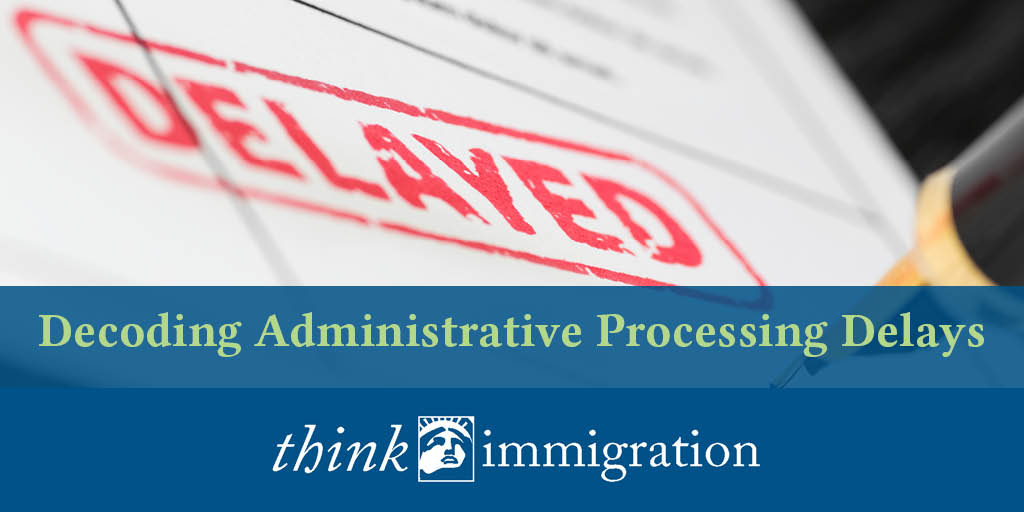Administrative processing, or INA §221(g), is the catch-all time period utilized by the U.S. Division of State to explain when a consular officer can not make a direct choice on a visa utility. Most visa functions are adjudicated by consular officers on the time of the interview at a U.S. embassy or consulate.
An applicant’s case or background may immediate further assessment, generally referred to as administrative processing. The ensuing delay creates vital hardships and monetary challenges for candidates, their U.S. citizen relations, and sponsoring U.S. employers and companies.
Going right into a visa interview effectively ready can decrease the chance of administrative processing, whereas figuring out the basis trigger might end in a quicker decision.
The Elevator Pitch
Consular officers are busy, usually interviewing as much as 120 visa candidates in a single day at high-volume posts like Monterrey, Mexico Metropolis, Sao Paulo, New Delhi, Guadalajara, Buenos Aires, Manila, and Guangzhou. Officers shortly assessment an applicant’s DS-160 nonimmigrant or DS-260 immigrant visa utility earlier than conducting a quick interview which will final just a few minutes.
Candidates who arrive ready with a concise elevator pitch that explains their case and highlights their {qualifications} improve their possibilities of approval on the interview.
Publish-Interview Transcript
When administrative processing is required, the officer ought to give the applicant a Type 221(g), which is able to record any lacking paperwork and supply directions for submission to the publish, if relevant.
Instantly after the interview, visa candidates ought to memorialize the consular dialog. Having a written document of the questions the officer requested and the responses will assist attorneys perceive why the case could also be present process administrative processing to plan one of the best ways to resolve it.
Visa Standing: Refused
A typical false impression is {that a} visa standing showing as “refused” on the Division of State’s Consular Electronic Application Center (CEAC) web site implies that the visa was “denied.” This isn’t the case within the context of administrative processing, and a refusal may be overcome.
One approach to distinguish between the 2 varieties of refusals, i.e., denied or present process administrative processing, is that the latter consists of a further paragraph that refers candidates to directions from the consular officer.
Attorneys might select to email the post to inquire in regards to the motive for the appliance’s refusal, taking into consideration that posts usually don’t disclose particular particulars, and to inquire whether or not any additional data is required from the applicant at this stage.
As soon as administrative processing is full, the publish will inform the applicant of its choice. The case standing on CEAC can even be up to date to both “issued” (visa granted) or “refused” (visa denied) with the date of the change, whereas now not displaying the annotation that refers candidates to the consular officer’s directions.
Components Underlying Administrative Processing
The dealing with and length of administrative processing rely upon the character of the case. The appliance might keep beneath assessment on the publish with the consular officer who interviewed the applicant, permitting the officer to manage the processing time. This usually happens when further documentation, data, or time is required to decide on a visa utility.
In different cases, consular officers could also be required to ahead the case to the State Division in Washington, D.C., the place the officer is not going to have entry to details about the standing of the case and lack authority to hurry up processing. One indication that decision may take a very long time is when the officer returns the applicant’s passport on the finish of the interview.
Administrative processing could also be prompted by varied elements:
Incomplete documentation. Lacking paperwork, akin to originals or incomplete medical exams, will delay visa issuance.
Lacking data. An officer could also be reluctant to decide on the interview if the applicant shouldn’t be effectively ready to reply questions in regards to the objective of the journey, monetary stability, or ties to the house nation.
Further assessment. A consular officer might have extra time to assessment a posh case.
Authorized query. A consular officer might want to assessment the regulation or the International Affairs Handbook (FAM), which offers directions associated to visa issuances. The officer may additionally contact the State Division’s Office of the Legal Adviser in Washington, D.C.
Prior visa denial. A consular officer could have entry to notes from a earlier denial by one other officer. Candidates must be able to make clear any modifications of their circumstances since their final interview.
Suspicion of fraud. A consular officers could also be suspicious in regards to the case and refer it to the Fraud Prevention Unit (FPU), which can conduct investigations and go to candidates or their employers within the U.S. and overseas to confirm that the knowledge within the petition is true.
Felony historical past. Background checks are usually carried out the day earlier than the visa interview to make sure essentially the most up-to-date data is offered. If an applicant has a prison document, the consular officer might have to conduct further analysis to find out the applicant’s eligibility for the visa.
Safety considerations. A Security Advisory Opinion (SAO) from the State Division in Washington, D.C., is required in circumstances involving nationwide safety considerations. SAOs are in depth biographic checks carried out by interagency companions from the intelligence neighborhood and regulation enforcement. They’re a black field that may take months to years to finish, till the interagency companions, which aren’t disclosed to the applicant, present their findings to the State Division. Consular officers do have the power to comply with up with the State Division about long-pending SAOs.
In conclusion, whereas sure elements that trigger consular processing delays are past our management, visa candidates can enhance their visa utility expertise by being ready with a compelling elevator pitch and all required documentation, writing down the consular dialog, and understanding the concerns which will result in administrative processing.
***
AILA members taken with studying extra about methods to tackle administrative processing delays could also be taken with AILA Nationwide’s Internet Seminar on October 12, Dealing with Consular Interview Delays, INA §221(g) Letters, and Administrative Processing: “What’s the Delay?”.

